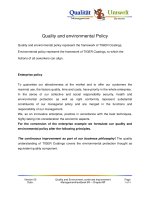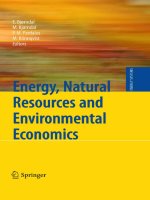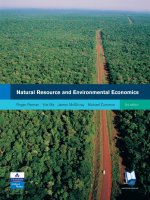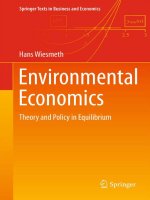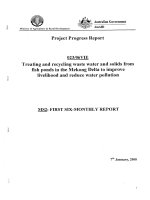Waste and environmental policy (routledge explorations in environmental economics)
Bạn đang xem bản rút gọn của tài liệu. Xem và tải ngay bản đầy đủ của tài liệu tại đây (2.07 MB, 238 trang )
Waste and Environmental Policy
This book deals with the increasingly complex issues of waste generation,
waste management and waste disposal that in less developed industrialised
countries arouse diverse but critical concerns. It takes a socio-economic and
policy-oriented perspective and provides empirical evidence at EU and regional
level. The EU and Italy are taken as relevant case studies, given the disparities
in environmental performance between less and more developed areas.
The rich and varied empirical evidence shows that a robust delinking
between waste generation and economic growth is still not present, thus
future policies should directly address the problem at the source by targeting
waste generation in EU countries. Some structural factors like population
density and urbanisation present themselves as relevant drivers of both waste
management and landfill diversion. Nevertheless, economic and structural
factors alone are not sufficient to improve waste performance. Though waste
policies are to be redesigned by covering the entire area of waste management,
some first signals of policy effectiveness are arising.
This work will be of most interest to students of environmental economics
and environmental sciences, as well as policy makers, waste utility managers
and companies in the waste management sector.
Massimiliano Mazzanti is lecturer in environmental economics and associate
professor at the University of Ferrara, Italy.
Anna Montini is assistant professor in economics and lecturer in economics
and environmental economics at the University of Bologna, Italy.
Routledge Explorations in Environmental Economics
General editor Nick Hanley
University of Stirling, UK
1 Greenhouse Economics
Value and ethics
Clive L. Spash
7 Ecological Economics and
Industrial Ecology
Jakub Kronenberg
2 Oil Wealth and the Fate
of Tropical Rainforests
Sven Wunder
8 Environmental Economics,
Experimental Methods
Edited by Todd L. Cherry,
Stephan Kroll and
Jason F. Shogren
3 The Economics of Climate
Change
Edited by Anthony D. Owen
and Nick Hanley
4 Alternatives for Environmental
Valuation
Edited by Michael Getzner,
Clive Spash and Sigrid Stagl
5 Environmental Sustainability
A consumption approach
Raghbendra Jha and
K. V. Bhanu Murthy
6 Cost-effective Control of
Urban Smog
The significance of the
Chicago cap-and-trade
approach
Richard F. Kosobud,
Houston H. Stokes,
Carol D. Tallarico and
Brian L. Scott
9 Game Theory and Policy
Making in Natural Resources
and the Environment
Edited by Ariel Dinar,
José Albiac and
Joaquín Sánchez-Soriano
10 Arctic Oil and Gas
Sustainability at risk?
Edited by Aslaug Mikkelsen and
Oluf Langhelle
11 Agrobiodiversity, Conservation
and Economic Development
Edited by Andreas Kontoleon,
Unai Pascual and
Melinda Smale
12 Renewable Energy from Forest
Resources in the United States
Edited by Barry D. Solomon
and Valeria A. Luzadis
13 Modeling Environmentimproving Technological
Innovations under
Uncertainty
Alexander A. Golub and
Anil Markandya
14 Economic Analysis of Land Use
in Global Climate Change Policy
Thomas Hertel, Steven Rose
and Richard Tol
15 Waste and Environmental Policy
Edited by Massimiliano Mazzanti
and Anna Montini
Waste and Environmental Policy
Edited by
Massimiliano Mazzanti and Anna Montini
First published 2009
by Routledge
2 Park Square, Milton Park, Abingdon, Oxon. OX14 4RN
Simultaneously published in the USA and Canada
by Routledge
270 Madison Avenue, New York, NY 10016
Routledge is an imprint of the Taylor & Francis Group, an informa business
This edition published in the Taylor & Francis e-Library, 2009.
To purchase your own copy of this or any of Taylor & Francis or Routledge’s
collection of thousands of eBooks please go to www.eBookstore.tandf.co.uk.
© 2009 Massimiliano Mazzanti and Anna Montini
All rights reserved. No part of this book may be reprinted or reproduced
or utilised in any form or by any electronic, mechanical or other means,
now known or hereafter invented, including photocopying and recording,
or in any information storage and retrieval system, without permission in
writing from the publishers.
British Library Cataloguing in Publication Data
A catalogue record for this book is available from the British Library
Library of Congress Cataloging in Publication Data
Waste and environmental policy / [edited by] Massimiliano Mazzanti &
Anna Montini.
p. cm. (Routledge explorations in environmental economics ; 15)
1. Refuse and refuse disposal European Union countries. 2.
Environmental policy European Union countries. I. Mazzanti,
Massimiliano. II. Montini, Anna.
HD4485.E85W365 2009
363.72'8 dc22
2008037950
ISBN 0-203-88137-0 Master e-book ISBN
ISBN 978 0 415 45936 5 (hbk)
ISBN 978 0 203 88137 8 (ebk)
This book is dedicated to
Anna Chiara and Paolo, and
to the future of Matteo and Pietro
Contents
List of figures
List of tables
List of contributors
Preface
Acknowledgements
List of abbreviations
Introduction
xi
xii
xiv
xvi
xix
xx
1
MASSIMILIANO MAZZANTI AND ANNA MONTINI
PART I
Waste generation, waste management and waste disposal:
macroeconomic analyses of delinking and policy effectiveness
1
Delinking and environmental Kuznets curves for waste indicators
in Europe: evidence on municipal solid waste and packaging waste
13
15
MASSIMILIANO MAZZANTI AND ROBERTO ZOBOLI
2
Waste generation and waste disposal: evidence on socio-economic
and policy drivers in the EU
34
MASSIMILIANO MAZZANTI, FRANCESCO NICOLLI AND ROBERTO ZOBOLI
3
Municipal waste generation, management and greenhouse gas
emissions
72
FRITS MØLLER ANDERSEN, METTE SKOVGAARD AND HELGE LARSEN
4
The drivers of MSW generation, disposal and recycling: examining
OECD inter-country differences
KATIA KAROUSAKIS
91
x
Contents
PART II
Waste generation, waste management and landfill diversion:
policy-oriented and regionally based analyses from Italy
5
Municipal waste generation, socio-economic drivers and waste
management instruments: regional and provincial panel data
evidence from Italy
105
107
MASSIMILIANO MAZZANTI, ANNA MONTINI AND ROBERTO ZOBOLI
6
Embedding landfill diversion in economic, geographical and policy
settings: regional and provincial evidence from Italy
126
MASSIMILIANO MAZZANTI, ANNA MONTINI AND FRANCESCO NICOLLI
7
Reducing uncertainty in the monetary assessment of environmental
liabilities from waste landfilling
154
TIZIANA CIANFLONE AND KRIS WERNSTEDT
8
Separation of organic waste and composting: European policies
and local choices
182
MASSIMILIANO VOLPI
Index
205
Figures
I.1
1.1
1.2
1.3
1.4
2.1
2.2
3.1
3.2
3.3
3.4
3.5
6.1
6.2
6.3
8.1
The income environment relationship
World CO2 emissions (million tons of C) and world GDP
level (million 1990 international Geary Khamis dollars)
CO2 emissions intensity (fossil fuels) of world GDP and
world GDP level (million tons of C per million 1990
international Geary Khamis dollars, selected years indicated)
Packaging waste generation per capita: EU-15
Municipal waste generation per capita: EU-28
Projected generation and landfill of municipal waste: EU-25
Use of landfill, incineration and material recovery as treatment
options, 2004
Developments in the management of municipal waste: EU-27,
1995 2006
Developments in municipal waste: EU-27
Developments in the management of municipal waste: EU-27,
1980 2020
Generation and landfill of BMW, and landfilled BMW as a
percentage of BMW generated in 1995, 1995 2020
Emission of GHG from the management of municipal waste:
EU-27, 1980 2020
Per capita landfilled waste in Italian provinces, (kg, 2005)
Per capita incinerated waste in Italian provinces, (kg, 2005)
Separately collected waste share in Italian provinces, (%, 2005)
Evolution of composting capacity, separation of organic waste,
separation of other waste, and estimated amount of organic
waste in remaining waste
2
19
19
24
24
35
36
80
84
86
87
88
130
131
132
196
Tables
1.1
1.2
2.1
2.2
2.3
2.4
2.5
2.6
2.7
2.8
2.9
2.10
2.11
EKC analysis of packaging waste
EKC analysis of municipal waste
Literature survey of waste-related studies
Descriptive statistics and a summary of research hypotheses
Main variables (1995 2005 values)
MSW generation regression results, EU-25
MSW generation, EU-15
MSW generation, EU-10
Landfilled MSW, EU-25
Landfilled MSW, EU-15
Landfilled MSW, EU-10
Incinerated MSW, EU-15
MSW generation regression results, EU-25: Swamy randomcoefficients linear regression model and dynamic analysis
2.12 MSW landfilled regression results, EU-25: Swamy randomcoefficients linear regression model and dynamic analysis
3.1 Model parameters for municipal waste generation, EU-15
3.2 Model parameters for generation of municipal waste, EU-12
3.3 Composition of municipal waste, 2005
3.4 Key economic and socio-economic assumptions
3.5 Projected changes in municipal waste, population and private
consumption, EU-27
4.1 Description and sources of the data
4.2 Descriptive statistics
4.3 Analysis of variance for all the variables
4.4 Parameter estimates for MSW generation
4.5 FGLS estimates of MSW generation
4.6 FGLS estimates of percentage landfilled
4.7 FGLS estimates of percentage of paper and cardboard
recycled
4.8 FGLS estimates of percentage of glass recycled
5.1 Descriptive statistics: dependent and independent variables
5.2 Provincial level: base estimations and additional specifications
26
27
40
45
46
53
54
55
56
58
58
59
61
61
75
77
82
83
85
94
95
95
96
97
100
101
101
111
115
List of tables
5.3
6.1
6.2
6.3
6.4
6.5
6.6
6.7
6.8
7.1
7.2
7.3
8.1
8.2
8.3
Regional level: base estimations and additional specifications
Descriptive statistics and research hypothesis (provincial data
set): dependent and independent variables
Descriptive statistics and research hypothesis (regional data
set): dependent and independent variables
Landfilled waste per capita: regional data, 1999 2005
Landfilled waste per area: regional data, 1999 2005
Other specifications with landfilled waste per capita,
1999 2005 (20 regions)
Specifications for landfilled waste per capita (semi-log model,
balanced panel), province analysis, 1999 2005
Specifications for landfilled waste per capita (log-log model,
unbalanced panel) provincial analysis, 1999 2005
Heckman two-stage regressions (probit + unbalanced panel)
Cost-based valuation approaches
Natural recoverability of NRD and human-directed
restorability of natural resources and services
Improper or illegal waste disposal that causes NRD
Variables included in the model and their expected effect on
composting
Data summary
Determinants of composting capacity: instrumental variable
estimation
xiii
118
133
134
136
136
137
141
144
146
164
165
169
192
195
197
Contributors
Frits Møller Andersen holds a master’s degree in economics from the University of Aarhus, Denmark, and is head of the Energy Systems Analysis
research programme at Risø-DTU. He has been responsible for the
development of several energy and environmental models used for Danish
and European forecasts and scenario analyses related to energy demand
and waste generation.
Tiziana Cianflone is an economist at the National Environmental Protection
Agency of Italy (APAT). She received her doctorate from the University
of Rome III for a thesis on ‘Institution, Environment and Economic
Development Policy’. Her work focuses on the economics of public
choice, heritage conservation, and natural resources and environment
quality.
Helge V. Larsen holds an MSc in electrical engineering and a PhD in energy
modelling from the Technical University of Denmark (DTU). She is
senior scientist at Risø-DTU and her specialism is the development of energy
models, especially for electricity systems and the integration of wind power
into the north European electricity system.
Katia Karousakis is an environmental economist and policy analyst in the
Environment Directorate of the Organisation for Economic Co-operation
and Development (OECD) in Paris. She holds a BSc from the University
of York, UK, a master’s degree from Duke University, Durham NC, and
a PhD from University College London.
Massimiliano Mazzanti is lecturer in environmental economics and assistant
professor at the University of Ferrara, Italy. For many years he has collaborated as research fellow with CERIS-CNR, an institute of the National
Research Council in Milan, and was awarded an MSc in Environmental
and Resource Economics by University College London.
Anna Montini is assistant professor in economics and lecturer in economics
and environmental economics at the University of Bologna, Italy. She also
collaborates as a research fellow with the National Research Council in
Contributors
xv
Milan (CERIS-DSE). She holds a PhD in political economics from the
University of Siena, Italy.
Francesco Nicolli is an environmental economist with a PhD in economics
awarded by the University of Ferrara, Italy, and a master’s in environmental
economics from the University of Birmingham, UK. His main research
interests are environmental and waste-related regulation in the European
framework, and applied microeconomics.
Mette Skovgaard holds a master’s degree in economics from the University
of Aarhus, Denmark. In her capacity as project manager at the ETC/RWM
Ms Skovgaard has conducted a number of analyses of policy measures in
a European context. Her special interests are policy effectiveness analysis
and scenario analysis within the field of waste and resource management.
Massimiliano Volpi received his PhD in economics from the University of
Milan and holds a master’s in Integrated Environmental Management
from IUSS, University of Pavia, in Italy. His main research interests hinge
on the econometric analysis of environmental policy and technological
change. He was a visiting PhD student at MERIT, Maastricht, Netherlands.
Kris Wernstedt is an associate professor in the School of Public and International Affairs at Virginia Tech University’s campus in Washington DC.
Since receiving his doctorate in planning from Cornell University, his work
has concentrated on environmental and economic aspects of contaminated
land, water resource planning, and the socio-economic dimensions of climate
change.
Roberto Zoboli is full professor of economics and political economy at the
Catholic University of Milan and research director of CERIS-DSE,
institute of the National Research Council of Milan. For many years he
has worked on issues such as innovation dynamics in firms and economic
systems, environmental policy evaluation, resource efficiency analysis and
trends.
Preface
This book originated from various institutional research projects and other
individual pieces of research, conducted since 2003 on the topic of waste
economics and policy, including waste management, the effectiveness of
waste policy at EU and national levels, and the evaluation of market and
non-market effects of landfill sitings. The analysis of waste has found some
collocation within a research area that deals with the decoupling of major
environmental pressures from economic growth, in which waste-related
issues are as relevant as, for example, climate change and water supply. The
sustainability of waste generation, management and disposal is key to the
wider issue of the sustainability of economic development.
We would underline that the chapters in this volume are not a collection
of papers associated with a single project but the product of different analyses, at the European and Italian levels, with diverse starting points, which
find some convergence and complementarity in terms of their methodology and
results. Much of the collaboration and complementarity among the researchers
involved in this volume is ongoing and further analyses of waste management, the economics of waste and assessments of waste and environmental
policy effectiveness can be expected.
Most of the research in this book has been developed co-operatively with
partners from the National Research Council in Milan (specifically the
Institute for the Study of Firms and Development, and Economic Systems
Dynamics, now CERIS DSE), the University of Bologna (Department of
Economics and Faculty of Law) and the University of Ferrara (Department
of Economics, Institutions and Territory). A major stimulus for the analytical work described in this book is the collaboration between CERIS-DSE,
APAT (the Italian Environmental Protection Agency), which is the data
source for most of these analyses, and the European Topic Centre on Waste
and Material Flows in Copenhagen. This collaboration started in 2002 3, in
the form of a series of projects under the umbrella of the European Environmental Agency (EEA) focusing on issues such as resource extraction and
management, waste packaging policies, EU policies for landfill diversion,
methodology for the evaluation of policy effectiveness, among others. The
results of these analyses are referenced and acknowledged as the inspiration
Preface
xvii
for the current work. In the course of this research, several doctoral students
joined the research network and the work on waste issues. They have contributed
greatly to several of the papers that form the chapters of this book.
Formal and informal research networks are defining and creating a set of
expertise and accumulated knowledge on waste policy effectiveness, the
driving forces for reductions in waste generation and landfill diversion. This
book, rather than being a conclusion, represents a departure in the direction
of new investigations and better evidence in relation to the complex web of
direct and indirect factors contributing to the target of reducing the economic and environmental pressures/costs associated with waste generation,
collection and disposal. This task is posing increasing challenges to institutions devoted to data collection and monitoring, which are required to provide detailed and reliable data in a difficult environment in terms of data
assessments, to researchers who need to define and refine economic and
policy-oriented empirical models, in which the interaction and endogeneity
that characterize certain key factors, the dynamic framework and the spatial/
regional features of waste systems are extremely challenging issues.
It should be noted that by chance the book was being compiled at a time
when the topic of waste became critical in parts of southern Italy. When the
delicate balance between waste generation and disposal breaks down, owing
to policy failures or inadequacies related to both waste collection and management, local environmental pressure hot spots emerge along with ‘not in
my backyard’ attitudes and behaviour. This is an especially vexed problem
with respect to the siting of landfills and incinerators. Some of chapters in
this book compare the northern and southern regions of Italy, which present
quite stark differences in terms of waste management performance. Some of
these are income-driven; others are policy-driven. Although specific and
associated with certain idiosyncratic features, the Italian analyses, which
compare economic and institutional performance across regions, and the EU
analyses, which focus on western countries and new members’ heterogeneity
in economic, institutional and social terms, are of general interest. This is,
first, because they provide food for thought for local and European policy
makers in the difficult environment characterized by increasingly stringent
targets with respect to various waste streams, at both management and disposal levels, and even stricter waste generation policy objectives for the
future. The convergence among different regions very often with very different structural economic situations will necessitate national or regionally
based implementation of EU policies on waste and environmental issues, in
order to reduce compliance costs and increase effectiveness. This is the most
important and most difficult task. Robust empirical evidence on the evolution of waste systems, and interactions between waste policies and economic
development, constitute the information required to eventually adjust and
reshape current and future frameworks. Second, the now rather long-standing
EU experience on waste policy implementation, which goes back to 1994
and in some national cases even before, might be relevant to other countries
xviii
Preface
or areas of the world that are trying to introduce waste-related efforts or
make them more effective. The evidence in this book on the importance of
various policy drivers, structural and economic backgrounds, and other
socio-economic and institutional features, in our opinion is generalizable to
other areas, making the book useful to a wide audience.
M.M.
A.M.
August 2008
Acknowledgements
We acknowledge the helpful comments from participants in workshops,
conferences and informal conversations. It would be impossible to identify
all individually, but we would especially thank Frits Møller Andersen, Mette
Skovgaard and Roberto Zoboli for their very helpful suggestions on many
parts and aspects of the analyses. Roberto Zoboli made an especially large
contribution, based on his very deep knowledge of innovation and waste
processes, in providing economic significance to the results of the empirical
analyses. We are indebted to him for what we have learnt over the years of
working together on the many projects on environmental economics issues at
the CERIS-DSE Institute of the National Research Council in Milan. Massimiliano Mazzanti is also intellectually indebted to Professor David William
Pearce, who was very stimulating as a research supervisor. Even a few words
exchanged with him were always full of valuable hints and support for young
researchers.
We also thank Federico Foschini and others working at APAT in Rome
for support on data-related issues. We thank Sara Fiocchi, Emanuele Gessi,
Valentina Iafolla, Lorenzo Ragazzi and Cecilia Vita Finzi for their work on
construction of the preliminary dataset. We are also indebted to the many
other people participants in the workshops and meetings on the effectiveness
of EU waste environmental policies, held between 2005 and 2008 at the
European Topic Centre on Waste and Material Flows and at the European
Environment Agency in Copenhagen, without whose input, comments and
discussion the quality of the papers that constitute the chapters in this book
would have been lower. Ultimate responsibility for their content, however,
remains with the authors.
We are also grateful to Cynthia Little for her very efficient and careful
revision of English style and grammar.
Massimiliano Mazzanti acknowledges financial support from the 2007
research funds for young researchers from the University of Ferrara and
general funding support from the local research funds of the University of
Ferrara in recent years. Anna Montini acknowledges financial support from
the research funds of the University of Bologna.
Abbreviations
ACM
APAT
AR
BAU
BMW
C&D
CBA
DCM
DEFRA
DTI
DWM
EAP
EEA
EIONET
EKC
ELV
EPA
ESI
ETS
EU
EUB
EUT
EUWM
FEM
GDP
GHG
GMM
ICT
IIASA
IMR
IPAT
IPCC
avoided cost method
Agenzia Protezione Ambiente e Territorio
auto-regressive
business as usual
biodegradable municipal waste
construction and demolition
cost benefit analysis
defensive (or mitigation) cost method
Department for the Environment, Food and Rural Affairs
Department of Trade and Industry
decentralized waste management
Environmental Action Programme
European Environmental Agency
European Environment Information and Observation
Network
environmental Kuznets curve
end of life vehicles
Environmental Protection Agency
environmental sustainability index
emissions trading scheme
European Union
environmentally undesirable behaviour
Expected Utility
environmentally undesirable waste management
fixed effects model
gross domestic product
greenhouse gas
general method of moment
information and communication technology
International Institute for Applied Systems Analysis
inverse Mills ratio
impact, population, affluence, technology
Intergovernmental Panel on Climate Change
Abbreviations
IPPC
IV
kg
LCA
LSDV
MSW
NIMBY
NRD
NRDA
OECD
PCB
RCM
R&D
REM
SCM
TEV
TP
UK
UN
UNFCCC
US
VA
WEEE
WG
WKC
xxi
integrated pollution prevention and control
instrumental variable
kilogram
life cycle assessment
least squares dummy variable
municipal solid waste
not in my back yard
natural resources damage
natural resource damage assessment
Organisation for Economic Co-operation and Development
polychlorinated biphenyls
restoration cost method
research and development
random effects model
surrogate cost method
total economic value
turning point
United Kingdom
United Nations
United Nations Framework Convention on Climate Change
United States
value added
waste electrical and electronic equipment
waste generation
waste Kuznets curve
Introduction
Massimiliano Mazzanti and Anna Montini
The chapters in this book are based on a series of papers that provide varying and complementary evidence related to the currently hot topic of waste
management and waste disposal, which is becoming unavoidable in both
developing and developed countries. For example, very recently, some areas
in southern Italy have been experiencing a collapse in their waste management performance, which at the time of writing has still to be resolved, and
is due mainly to a set of factors such as low proportion of separated waste
collection, absence of serious alternatives to landfill, increasing scarcity of
land in densely populated areas, failures in local policy implementation and
property rights enforcement. The problem with waste management and correlated externalities resulting from landfill is that waste stock accumulates,
and the process is difficult to reverse when the balance between inflows of
waste generated and outflows of waste treated becomes uneven.
Waste generation and waste disposal are becoming increasingly prominent
issues in the environmental arena, both in terms of policy perspectives and in
the context of delinking analysis. Waste generation is increasing more or less
proportionally with income, and the economic and environmental costs
associated with landfill are also increasing. Thus waste management, from
production to disposal, is an environmental issue no less relevant, and
potentially more critical, than water scarcity or climate change. It interlinks
with climate change, since incineration, recycling and landfill all result in the
production of greenhouse gases (GHG). Diversion of waste from landfill
(landfill diversion) is one of the options being used to reduce these emissions.
The main questions addressed in this book refer to the extent to which the
diverse waste flows generated by household and economic activities are
decoupled or not from the growth in income per capita. Decoupling or
delinking analysis, to some extent related to the more specific realm of
environmental Kuznets curve (EKC, see Figure 1 for an intuitive sketch) and
to conceptual frames such as IPAT (an accounting identity used to identify
the relative role of P population level, A affluence and T technology for
the observed change in I impact over time and/or across countries), is the
primary tool used to assess whether or not environmental performance is
improving. Without any other judgements (from outside economics, from
2
Massimiliano Mazzanti and Anna Montini
Figure I.1 The income environment relationship
saving capital-based rules of sustainability) it should be noted that delinking
per se cannot lead automatically, even in its absolute form, to sustainability.
In other words, observing a decrease in environmental pressures for waste,
the set of externalities associated with waste generation, incineration and
landfill along the dynamics of economic growth is a positive element but
does not automatically imply that sustainability will be achieved. Nevertheless,
absolute decoupling is the way towards sustainable performance: increasing
the environmental efficiency of economic growth by moving the environment
income relationship below critical thresholds in terms of environmental impacts.
European Union (EU) policy thematic strategies on resources and waste
include reference to absolute and relative delinking indicators (EC 2003a, b;
Jacobsen et al. 2004). The former, according to the EKC framework, is a
negative relationship between economic growth and environmental impacts
associated with the descending side of an inverted U shape. The latter is a
positive, but decreasing in size, income environment relationship
the
ascending path a positive, lower than unity elasticity in economic terms.
No delinking is observed in the ascending part of the EKC, in case of a
unitary or higher than unity elasticity. The achievement of increasing delinking
experience is a prime necessity for waste, an issue that is of equal relevance
in terms of environmental impact and economic costs, to climate change.
The European Environmental Agency (EEA), has often acknowledged
that ‘it is increasingly important to provide answers to these questions
because waste volumes in the EU are growing, driven by changing production and consumption patterns. It is also important because there is growing
interest in sharing best practice and exchanging national-level experience
across Europe, with the common goal of achieving more cost-effective solutions
to the various problems being faced’ (EEA 2007: 4).
Indicators of decoupling/delinking are becoming increasingly popular for
detecting and measuring improvements in environmental/resource efficiency
with respect to economic activity at the level of and in connection with
policy making and policy evaluation. The Organization for Economic Cooperation and Development (OECD 2002) has conducted extensive research
